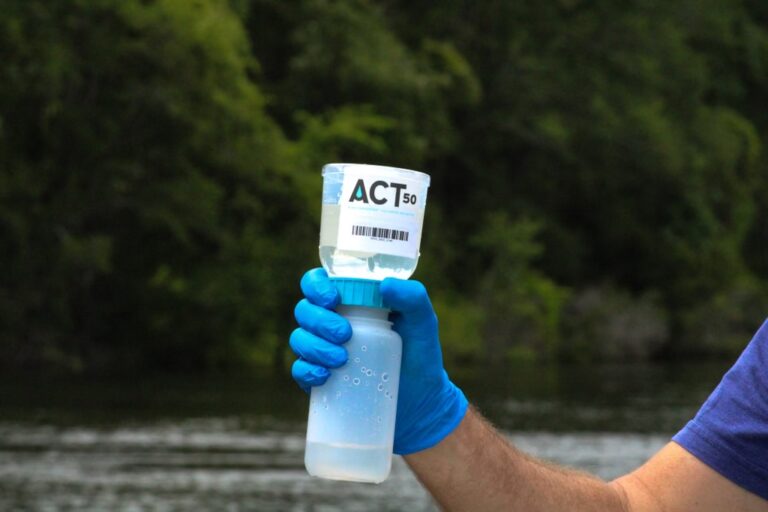Waterkeeper Alliance and Cyclopure to Test More Than 130 American Waterways for PFAS Contamination
By: Thomas Hynes

Waterkeeper Alliance and Cyclopure today announced the launch of an unprecedented nationwide initiative to test American waterbodies for per- and polyfluoroalkyl substances (PFAS), a group of emerging contaminants linked to harmful effects to public health and the environment.
Widely used in manufacturing since the 1940s, PFAS are often referred to as ‘forever chemicals’ because they do not break down and they accumulate in people, wildlife, aquatic life, and the environment over time. Present in surface water, air, soil, food, and many commercial materials and products, PFAS are also found in groundwater, which provides nearly 50% of U.S. drinking water and is a major source for crop irrigation and agricultural production.
According to the U.S. Environmental Protection Agency (EPA), current peer-reviewed research indicates links between PFAS exposure and serious health conditions such as cancer, liver and kidney disease, reproductive issues, immunodeficiencies, and hormonal disruptions. Even with the clear danger and prevalence of PFAS, broad-based action to address contamination (e.g., comprehensive water testing; regulatory oversight and enforcement at the source and downstream; investment in research and technologies; and implementation of treatment applications) has been slow and inadequate to date.
“PFAS contamination is a serious threat that has garnered national attention due to the toxicity and presence of these chemicals in the blood of the general population,” said Marc Yaggi, CEO of Waterkeeper Alliance. “We know that there are 9,000 different PFAS substances present in the environment; yet, the full scope of the contamination is not well understood, as only limited information exists about PFAS in surface water. To help bridge the gap and support solutions, we’re working with Cyclopure to secure and analyze a collection of samples taken by 134 local Waterkeeper groups within a fixed-time period in surface waters across the country.”
Scheduled for June and July, Waterkeeper groups will use Cyclopure kits to test for 55 PFAS structures – including 21 precursors and all compounds listed in EPA test methods. Following the testing period, the partners will analyze the samples and generate one of the country’s first and most comprehensive PFAS surface water data sets to be shared in a nationwide report. The report will include upstream and downstream test comparisons, geospatial mapping, as well as geographic and population analytical segmentation.
“Cyclopure is excited to partner with Waterkeeper Alliance as their nationwide network of Waterkeepers provides a unique opportunity to conduct a coordinated test program in waterways across the country,” said Frank Cassou, CEO of Cyclopure, Inc. “Our PFAS water test kit is well-suited for this activity because it provides a convenient method for Waterkeepers to take field samples. Specifically, our DEXSORB® adsorbent for PFAS in a filtration disc permits point-of-site extraction, which eliminates the need to ship water samples to a lab. It was great to see over 250 test kits go out the door all at once to every corner of the country. Waterkeeper Alliance has shown incredible leadership by organizing and sponsoring this important activity. We look forward to the valuable information and data that will come from this summer’s testing.”
As a valuable data set for Congress, EPA, water utilities, researchers, and communities, the report will be released ahead of the Clean Water Act’s 50th anniversary this fall. Waterkeeper Alliance hopes that this initial monitoring period and report will be the first of a multi-phase, multi-year initiative to provide targeted water monitoring with future expansion to locations outside of the United States.
“Though there is currently no universal, science-based limit or ban for PFAS, we’re starting to see brands remove these chemicals from their products as well as a patchwork of regulatory limits enacted by some states,” continued Yaggi. “Congress and EPA are also working on new rules that would designate some of these chemicals as hazardous substances, and require limits for the toxins under the Clean Water Act and the Safe Drinking Water Act. It’s a start, but it’s not enough. We hope our data will highlight the immediacy of these issues, and we will use it to elevate PFAS regulation and remediation as a national priority.”
To gain support for PFAS and other clean water policies, Waterkeeper Alliance will meet with members of Congress on June 8th as part of the joint Action Day for Clean Water with American Rivers and River Network. Waterkeeper Alliance and more than 150 Waterkeeper organizations from around the world are also in Washington, D.C. this week for its global conference at the Capital Hilton, June 8-12.